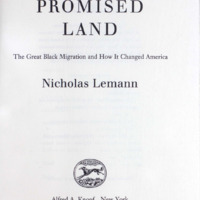-
Title
-
The promised land : the great Black migration and how it changed America
-
Description
-
Provides identity to those who have been participants in Afro-American diaspora, and examines the issues of urban disintegration and rural poverty.
-
Identifier
-
372084
-
394560043
-
Creator
-
Lemann, Nicholas
-
Format
-
1st ed.
-
Source
-
Brian Lamb Booknotes Collection
-
Gift of Brian Lamb, 2011.
-
Catalog record
-
Language
-
eng
-
Date
-
1991
-
Program air date: May 5, 1991.
-
Publisher
-
A.A. Knopf
-
George Mason University. Libraries. Special Collections & Archives
-
Text
-
Transcription of Annotations
Front end paper: Mechanical cotton picker, sharecropper, Ruby Lee Hopkins/ Daniels, Luther Haynes, Cardinal Stritch, William Dawson, Robert Weaver, Richard Daley. Underlinings and notes: Mechanical cotton picker made share-cropping obsolete. Issue of race. Cotton picker set stage for end of segregation. 1910-1970 6.6 million Blacks moved from South to North. Outranks migration of any other ethnic group. Story of post mechanical cotton picker race relations shorter than race relations when race revolved around cotton culture. half century vs. three centuries.1940s. Ruby Lee Hopkins, b. 1916. Uless Carter--photos 1. Black people in bare, plowed cotton field; 2. Uless at 25, in first suit, Chicago; 3. Uless at 40. South Side--largest contiguous settlement of African-Americans. Black people charged more rent/paid lower wages than white people. Reverend Carter. Ruby Daniels returned to Chicago in 1948. 1940s Chicago, black population increased by 77% from 278,000 to 492,000; 1950s grew by 65% to 813,000--at one point 2,200 black people moving to Chicago weekly. Samuel Cardinal Stritch. Mayor Kelly, adviser on Negro affairs was Robert Weaver. Ugly racial incidents, white neighborhoods on South Side had "improvement associations" to keep blacks out. Kennedy campaign offered to by Simeon Booker's Jet magazine column. Congressman William Dawson of Chicago and Adam Clayton Powell of New York. Oct. 1960, JFK calls Coretta King. Sargent Shriver. Kennedy civil rights. John Kenneth Galbraith's "The Affluent Society." Walter Heller, head of JFK's Council of Economic Advisers, liberal in clean, precise world of numbers and orderly concepts. JFK tells Heller to look into new poverty program. Johnson said that Eastern liberals would not like him because he was a not-very-well educated Southerner. Heller and Johnson. JFK too conservative for Johnson. War on poverty. Shriver signaled to Johnson not blindly loyal to RFK. Frank Mankiewicz, Daniel Patrick Moynihan. RFK strong supporter of community action. Job Corps. Wirtz, Moynihan believer in government jobs programs. John Lewis, head of SNCC. 1965 Johnson aid Joseph Califano submits full-scale reorganization plan for war on poverty. Shriver defensive, enemies Kenneth O'Donnell, problems with Daley. John Connally, frequent caller to White House, complained of OEO. Shriver tells LBJ can eliminate poverty in US, LBJ says cannot spend such money. Moynihan report showed his ability to spot trends in intellectual life and thirst for more attention than normal for intellectuals. Unemployment rate/ new welfare cases disaggregate; unemployment falling while welfare cases rising. Richard Goodwin. Report refuted. Liberal left can be rigid and destructive. LBJ totally political, no hobbies, no reading, barely sit through movie. LBJ on passage of Civil Rights Act--gave South to the Republicans. RFK privately contemptuous of Johnson. 1966 Johnson's Model Cities bill. Moynihan/Nixon deep dislike of left-liberal political culture of past 3-4 years. Nixon stayed away from integration of schools/ neighborhoods in the North. Moynihan--Family Assistance Plan. Kermit Haynes in gang, gang leader. Gangs changed Robert Taylor Homes from decent housing for black poor to hellholes. 1990 Robert Haynes turned up in Clarksdale. Ghettos deteriorated badly in last three decades. Ules Carter, George Hicks, Ruby Haynes. Public housing. Black success since 1960s=leaving, not fixing ghettos. Intervention programs work. Head Start--higher graduation/employment rates, lower arrest/teen pregnancy. Job Corps. Welfare could be temporary, leading to job. Housing programs could screen/kick out bad tenants. Federal government not state or local led way on race. US racial prejudice/conscience. William Whitworth--published several articles, suggested Chicago as main setting. Grace Jones Cleveland and family of Chicago shared family history, but do not appear in book. Acknowledgements extensive. Title from Claude Brown's "Manchild in the Promised Land."
-
Subject
-
"African Americans--Migrations--History--20th century."
-
"Rural-urban migration--United States--History--20th century."
-
Relation
-
Original Booknotes interview
-
Rights
-
This work may be protected by copyright laws and is provided for educational and research purposes only. Any infringing use may be subject to disciplinary action and/or civil or criminal liability as provided by law. If you believe that you are the rights-holder and object to Mason’s use of this image, please contact speccoll@gmu.edu.
 372084.pdf
372084.pdf